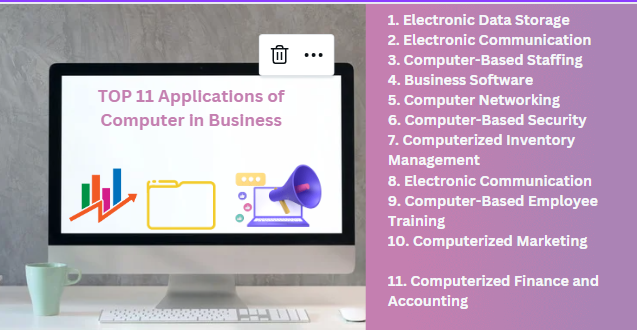Computer applications are now a necessary tool for all businesses. Whether it’s communication, inventory management or accounting, computers can improve productivity and increase accuracy.
Without computer application, modern business would almost instantly grind to a halt. From recording inventory to communicating with clients, there are many ways computers can help a company succeed.
1. Online Marketing
Having computer applications helps businesses to promote themselves online. They help to get the business information in front of many people and also to connect with clients. It also helps in storing all the data of the business in digital format which can be used for various purposes over time.
A business can use different software for its marketing needs which include sales analysis, customer service management and more. These software help the business to run its advertisement on many platforms including google, youtube, bing, yahoo etc.
Other computer applications that are important in a business include word processing and presentation programs, spreadsheets for manipulating alphanumeric data, and accounting software for tracking expenses, balancing books, and recording payroll. Using these software, businesses can reduce waste and increase efficiency and productivity. Whether in training, marketing, or finance/accounting departments, computers make work faster and more accurate than it was 20 or 30 years ago. They are necessary for running any business today. Without them, companies wouldn’t be able to compete with other firms and provide customers with a better product.
2. Customer Relationship Management (CRM)
If a business wants to stay in contact with clients, then it needs a proper customer relationship management (CRM) system. CRM is a computer application that helps businesses manage customer information, such as sales records, purchases, and support inquiries.
With the help of this computer program, companies can quickly respond to inquiries and concerns from their customers. It also makes it easier for businesses to gather customer data for future marketing efforts.
Without computers, modern business and industry would grind to a halt. From storing information to communicating with clients, computers are used in thousands of ways.
Various types of business software have been created to make businesses more efficient. These programs can be purchased off-the-shelf from vendors and run on either desktops or large servers. They include word processors, mathematical spreadsheets, and even supply-chain management systems. In addition to these standard programs, many business owners develop their own applications. These can be anything from a simple spreadsheet to a complex algorithm. These custom programs can be used to increase productivity and measure accuracy.
3. Inventory Management
Inventory management is a crucial aspect of any business. If it is not done well, companies can waste time and money. The right software solutions allow businesses to track inventory at all levels and reduce out-of-stock situations.
This process involves a series of steps to keep inventory accurate and on target. First, goods are inspected and sorted. Then, they are stored in designated stock areas. Finally, the inventory is updated and shared with relevant stakeholders. If inventory is low, the system may automatically trigger a purchasing or reordering process.
The most advanced types of inventory systems leverage automated software solutions that deliver real-time insights. These systems update balances instantly as soon as goods are moved, sold, used, or discarded, aided by scanners that read product barcodes and RFID tags.
Regardless of the inventory management technique you use, it is critical to make sure that all data is updated regularly. This helps ensure that the data is accurate and can be retrieved quickly. Wrike is a project management tool that can help with this process and can save you time and money.
4. Accounting
Computer application in business has made it easier to communicate and connect with clients and also makes it more efficient for businesses to record and analyze data. Computer software is also crucial for ensuring that all aspects of a company’s business are running smoothly, such as accounting.
Computer applications allow users to use computers to manipulate information in ways unimaginable even a decade ago. Some of these computer applications include word processing, spreadsheet, and presentation software. The latter is used for making presentations or slides for internal or external audiences.
Spreadsheet software allows a user to manage alphanumeric data and organize it in different types of tables, charts, and graphs. A typical example of this is Microsoft Excel.
Computer application in business helps companies perform their tasks more efficiently, which leads to increased productivity. In addition, it helps companies stay competitive in the market. It is impossible to imagine running a business without the help of computer systems today.
5. Social Media
Computer applications in business can be a very important tool to increase the efficiency of any company. Many of these programs can provide a variety of ways to communicate with your employees and clients, reducing the need for physical meetings and cutting down on travel time. They can also be used to help train new employees and tutor existing ones on skills.
One of the biggest benefits of Computer application in business notes is the ability to access a wealth of information quickly and easily. This can be anything from research data to competitor information to market trends. It is a great way to stay on top of the latest news and developments in your industry, improving your company’s performance over time.
Some people have a very restricted view of what counts as social media, often only referring to things like Facebook or Twitter. However, even things like blogs can be considered as part of this category if they are built around an open platform. Social media has transformed publishing from a one-way stream of information into a two-way conversation, allowing brands to interact directly with their audience.



